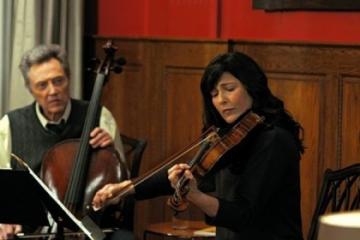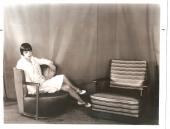'Late Quartet': Powerful performances fuel Beethoven's string theory
Breaking up is so very hard to do, says the song. The only thing harder is staying together, says "A Late Quartet," Yaron Zilberman's beautiful chamber film about the making of chamber music and its creators.
The foursome in focus is the Fugue, an internationally acclaimed string quartet preparing a triumphant 25th anniversary tour with its signature performance of Beethoven's Op. 131 string quartet.
No musical form is more beautiful, more profound for soul-gazing -- or more difficult. The string quartet is classical music's ultimate dialectical mode of disputation, with just enough voices to fashion a full argument but none to spare. (And nobody was more argumentative than Beethoven.) It's more about the bones than the flesh of music.
But it requires human flesh to produce -- four stars, or potential stars, with the rare ability to subvert their egos for the greater good and exquisite balance of the group. Daniel (Mark Ivanir) is the Fugue's virtuoso first violinist, a powerhouse of flair and intensity. Robert (Philip Seymour Hoffman) plays a brilliant second violin, providing the color and texture that make Daniel shine and connect him to the viola and cello. Robert's wife, Juliette (Catherine Keener), is a violist "who makes you want to weep without knowing why." Cellist Peter (Christopher Walken) -- the group's father-figure founder -- closes the perfect square with perfect warmth and depth.
But a shattering medical diagnosis convinces Peter he must retire. Now, not later. His insistence on finding an immediate replacement unleashes a simmering set of hitherto hidden resentments that undermine not just the harmony but the melody and the very survival of the quartet: Robert is tired of literally playing second fiddle. He wants to switch parts with Daniel -- and is devastated when Juliette disagrees.
Robert and Juliette have domestic sexual issues, as well, plus a smoldering daughter (Imogen Poots), who studies violin with Daniel. Robert thinks Daniel rigid as both a man and a musician, afraid to play without music, afraid to let his passions loose. Daniel will be loosing them soon, much to Robert's chagrin.
The lovely structure of "A Late Quartet" parallels that of the Op. 131 quartet in C-sharp minor itself -- Beethoven's most demanding and precedent-shattering. Some 40 minutes long, its seven movements are played without a break or pause. Unlike any before it, it opens with an adagio (that Wagner called "the most melancholy sentiment ever expressed in music"). By contrast, its brilliant presto section is a hilarious footrace, or finger race, that ends (as it must) in a tie. The main exposition and development sections are separated by short "episodes" for transition and emotional release. The finale quotes the opening -- likewise avant-garde -- for a monumental feat of integration in six keys, with musical-spiritual references to Beethoven's Missa Solemnis.
"After this," said Schubert, "what is left for us to write?"
Stringed instruments go out of tune during rough usage. How do you play such a massive thing without stopping to correct the pitch? People and their relationships go out of tune, as well. How do you stop and fine-tune your life in the middle? The word "fugue" comes from both fugere (to flee) and fugare (to chase).
"A Late Quartet" features five excellent, highly differentiated performances. Mr. Walken's Rock-of-Gibraltar cellist lacks any hint of the actor's past idiosyncratic quirkiness. Mr. Hoffman is uncharacteristically needy and sympathetic. Mr. Ivanir's supercilious perfectionist is a fine foil to them. Ms. Keener and Ms. Poots make never a false move.
The actors' musical renderings are convincing, though there's not quite enough music (actually played by the fine Brentano String Quartet) overall, for my taste. All those real-life "star" quartets -- the Guarneri, the Emerson, the Borodin -- come to mind fondly throughout. Director Zilberman has clearly loved and studied them and their subtle methods of communication by glances and inference. There is relatively sparse dialogue.
In a sense, the real star is Op. 131 -- its own internal conflict-to-resolution -- more than that of the characters.
The film's weakness, unfortunately, lies in the melodramatic interpersonal bent of Mr. Zilberman's script. "Art demands great personal sacrifice." Right. But mother-daughter issues demand a little more scrutiny. And Michael Hollinger might demand to know why his stage play "Opus" wasn't credited as an inspiration. Mr. Zilberman's story lines converge a little too conveniently, and sentimentally.
Nevertheless, the dynamic tension here between the "I" and the "we" is fascinating. We get back to Beethoven -- and "Get Back!" to basic Beatles, basically breaking up. At least "A Late Quartet" is a little more redemptive than "Let It Be."






